The planet Jupiter is a complement to Saturn in many ways. While Saturn is associated with limitation and loss, Jupiter symbolizes growth, optimism, abundance, wisdom, faith, luck, and generosity. (Yes, the largest planet in the solar system is associated with things like exaggeration and increase.) And while Saturn isn’t truly a “bad” planet, Jupiter isn’t always “good” either, even though we tend to like Jupiter’s associations more than what Saturn represents. So it may not be a surprise that the five cards of the Minor Arcana that have astrological associations involving Jupiter aren’t all cheery and bright but have a wide range of meanings. Still, in keeping with Jupiter’s basic nature, the sign that Jupiter is in shows what it idealizes, like Saturn’s sign shows what it feels insecure about.
Again, when you look at a planet from the perspective of the tarot, you’re not seeing it completely. These meanings of Jupiter are similar to the sorts of interpretations astrologers use for Jupiter in people’s charts, but these are simpler, less nuanced. Astrology and tarot have correspondences between them, but they’re not identical.
Six of Wands: Jupiter in Leo
Jupiter is optimistic, expansive, and generous, qualities that go well with Leo. Leo represents the need to creatively express yourself and to be recognized and appreciated. At its best, it’s confident, commanding, and magnanimous, although it can also be narcissistic, dictatorial, and overbearing. In Leo, Jupiter grows and expands in the oh-so-Leonine way of being creative. Appreciation from others fuels Jupiter’s optimism and faith in life, and it’s with Leo’s confidence, that Jupiter dares to go further, see more, and understand more.
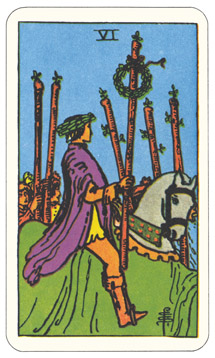 Jupiter in Leo idealizes grandeur, drama, and attention, and this is what’s shown on the Six of Wands. In the Waite-Smith illustration, a man rides forth triumphantly, accompanied by followers. He wears a wreath on his head and another one hangs from the wand he’s carrying. Whether he’s departing to face a vital challenge or returning home, he’s the center of attention. The Golden Dawn named this card Lord of Victory, but the card itself is deliberately ambiguous about what this victory may be and if it’s occurred yet. In Waite’s Pictorial Key to the Tarot, he says, “The card has been so designed that it can cover several significations; on the surface, it is a victor triumphing, but it is also great news, such as might be carried in state by the King’s courier; it is expectation crowned with its own desire, the crown of hope, and so forth.” Perhaps Our Hero is returning in triumph, but it’s also possible that he’s being sent off with great fanfare to what everyone hopes will be victory, but which isn’t guaranteed. Sometimes, confidence and faith in victory are what’s needed for victory: “expectation crowned with its own desire.” And that would fit Jupiter, which cannot conceive of defeat because it has never reached its limits. Limits, after all, are a Saturn thing.
Jupiter in Leo idealizes grandeur, drama, and attention, and this is what’s shown on the Six of Wands. In the Waite-Smith illustration, a man rides forth triumphantly, accompanied by followers. He wears a wreath on his head and another one hangs from the wand he’s carrying. Whether he’s departing to face a vital challenge or returning home, he’s the center of attention. The Golden Dawn named this card Lord of Victory, but the card itself is deliberately ambiguous about what this victory may be and if it’s occurred yet. In Waite’s Pictorial Key to the Tarot, he says, “The card has been so designed that it can cover several significations; on the surface, it is a victor triumphing, but it is also great news, such as might be carried in state by the King’s courier; it is expectation crowned with its own desire, the crown of hope, and so forth.” Perhaps Our Hero is returning in triumph, but it’s also possible that he’s being sent off with great fanfare to what everyone hopes will be victory, but which isn’t guaranteed. Sometimes, confidence and faith in victory are what’s needed for victory: “expectation crowned with its own desire.” And that would fit Jupiter, which cannot conceive of defeat because it has never reached its limits. Limits, after all, are a Saturn thing.
Nine of Cups: Jupiter in Pisces
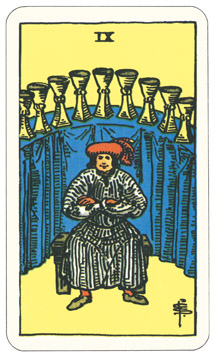 It might seem odd that Jupiter, a planet that is comfortable in fiery, expressive Leo, feels at home in sensitive, retiring Pisces. There’s a lot of overlap between the two, though. Both Jupiter and Pisces are idealistic (and unrealistic). Influenced by Pisces’ compassion, Jupiter’s benevolence can be true charity towards the unfortunate, although this can also be a gullible combination. And Pisces dissolves boundaries, its infinite qualities a good match for Jupiter’s constant need to expand.
It might seem odd that Jupiter, a planet that is comfortable in fiery, expressive Leo, feels at home in sensitive, retiring Pisces. There’s a lot of overlap between the two, though. Both Jupiter and Pisces are idealistic (and unrealistic). Influenced by Pisces’ compassion, Jupiter’s benevolence can be true charity towards the unfortunate, although this can also be a gullible combination. And Pisces dissolves boundaries, its infinite qualities a good match for Jupiter’s constant need to expand.
Jupiter in Pisces idealizes universal love and compassion. I have trouble seeing that in the Waite-Smith take on the Nine of Cups. It shows a man sitting in front of nine gold cups that presumably signify his wealth and material security. Jupiter can be excessive, and there’s a hint of that in this card: how many cups does a person need for a comfortable life, anyway? In many Waite-Smith clones, the man or woman in the card appears ready to offer a cup to others, but in this, the original illustration, the man’s arms are crossed and he seems prepared to keep all the cups for himself. (See Nine of Cups: I’ve got mine for more on the Waite-Smith illustration.) Regardless, his happiness is evident, and the illustration fits the Golden Dawn title Lord of Material Happiness. The Nine of Cups is often called the “wish card.” Supposedly, if it shows up in your reading, you’ll get what you wished for. That, at least, fits Jupiter’s associations with luck.
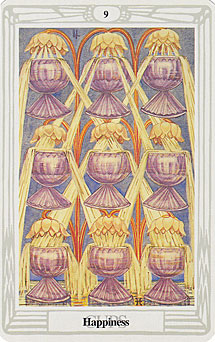 The Waite-Smith Nine of Cups anticipates a “better” (immaterial) happiness in the Ten of Cups. In the Thoth deck, the Nine of Cups is the peak of the suit. Crowley calls the card Happiness and leaves it at that. Nine cups are arranged in a neat and symmetrical 3 x 3 grid. Nine flowers pour water into the cups, which are overflowing. The card is mostly purple and gold, much livelier colors than the heavy dark greens of the Eight of Cups. As a more positive card, this seems a better match to Jupiter in Pisces.
The Waite-Smith Nine of Cups anticipates a “better” (immaterial) happiness in the Ten of Cups. In the Thoth deck, the Nine of Cups is the peak of the suit. Crowley calls the card Happiness and leaves it at that. Nine cups are arranged in a neat and symmetrical 3 x 3 grid. Nine flowers pour water into the cups, which are overflowing. The card is mostly purple and gold, much livelier colors than the heavy dark greens of the Eight of Cups. As a more positive card, this seems a better match to Jupiter in Pisces.
Four of Swords: Jupiter in Libra
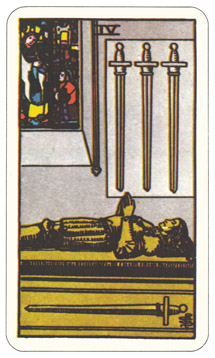 In Leo, a fire sign, Jupiter was able to express its enthusiasm; in Pisces, a water sign, it was able to express its compassion. But Libra is an air sign, and air is emotionally detached, neither passionate like fire nor empathetic like water. When Jupiter is in an air sign, it gets no support for its natural exuberance. Planets in Libra behave harmoniously, pleasingly, and diplomatically, which tends to mute Jupiter, as though Libra were always telling Jupiter to use its inside voice and walk, don’t run.
In Leo, a fire sign, Jupiter was able to express its enthusiasm; in Pisces, a water sign, it was able to express its compassion. But Libra is an air sign, and air is emotionally detached, neither passionate like fire nor empathetic like water. When Jupiter is in an air sign, it gets no support for its natural exuberance. Planets in Libra behave harmoniously, pleasingly, and diplomatically, which tends to mute Jupiter, as though Libra were always telling Jupiter to use its inside voice and walk, don’t run.
Jupiter in Libra magnifies and values peace, calm, and harmony. The Waite-Smith Four of Swords depicts this as a silent mausoleum. Despite the tomb in the illustration, the card isn’t about death (no Four is that permanent!). As the Golden Dawn title Lord of Peace from Strife suggests, the Four of Swords has to do with rest and recuperation, retreating from the everyday world until you’re ready to deal with it again. No matter how much you might want to be energetic and active à la Jupiter, this card advises you that it’s time to back off and take a break.
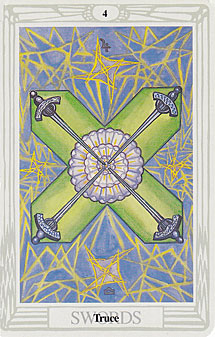 The Thoth Four of Swords—Truce—differs a bit in meaning from the Waite-Smith version, yet it fits the astrological symbolism as well. As I mentioned, Jupiter idealizes peace and harmony. One of Libra’s weak points, though, is that it can be willing to accept the appearance of peace, even if the real thing is missing. The combination of Jupiter’s optimism and Libra’s reluctance to disturb the balance can result in a temporary “truce” rather than true peace. At first glance, Harris’s illustration is nicely symmetrical, with four swords meeting in the center of a large rose. But the center motif is a distraction from the jangled patterns in the background.
The Thoth Four of Swords—Truce—differs a bit in meaning from the Waite-Smith version, yet it fits the astrological symbolism as well. As I mentioned, Jupiter idealizes peace and harmony. One of Libra’s weak points, though, is that it can be willing to accept the appearance of peace, even if the real thing is missing. The combination of Jupiter’s optimism and Libra’s reluctance to disturb the balance can result in a temporary “truce” rather than true peace. At first glance, Harris’s illustration is nicely symmetrical, with four swords meeting in the center of a large rose. But the center motif is a distraction from the jangled patterns in the background.
Eight of Swords: Jupiter in Gemini
In the Minor Arcana, Jupiter is in two air signs, Libra and Gemini. If Libra shushed Jupiter, Gemini scatters it hither and yon. Gemini is mutable air, a sign that at its best is curious, versatile, and communicative, but can also be superficial, capricious, and detached to a fault. Jupiter doesn’t feel all that comfortable in Gemini: it’s hard for it to throw itself wholeheartedly into anything when Gemini is pushing it to look at everything, do everything, have an opinion about everything(!).
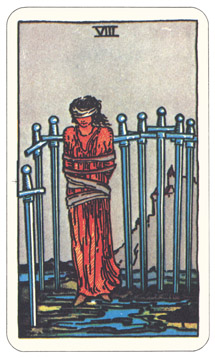 However out of place Jupiter may feel, its nature is to idealize and exaggerate the qualities of its sign, so here it magnifies Gemini’s love of details and rational approach to life. Unable to really commit to any one thing, Jupiter is lost in an ever-growing storm of facts, points of view, details, and trivia. There’s no organization here, just random thoughts, fragments of ideas, scattered data, etc. It’s a brainstorm rather like the Great Red Spot on the astronomical Jupiter: large and apparently never-ending.
However out of place Jupiter may feel, its nature is to idealize and exaggerate the qualities of its sign, so here it magnifies Gemini’s love of details and rational approach to life. Unable to really commit to any one thing, Jupiter is lost in an ever-growing storm of facts, points of view, details, and trivia. There’s no organization here, just random thoughts, fragments of ideas, scattered data, etc. It’s a brainstorm rather like the Great Red Spot on the astronomical Jupiter: large and apparently never-ending.
All that sounds exciting and high-energy. By comparison, the illustration on the Waite-Smith Eight of Swords is static, but there’s a connection nonetheless. The picture is of a woman bound and blindfolded, standing outside with eight swords stuck in the ground behind her and to one side. She’s not tied tightly and no one is guarding her, so she could wriggle free and get away if she only believed that she could. Belief is a Jupiter thing, but it’s hampered here. The card means being trapped in familiar but unhelpful patterns, unable to think outside of the box, stuck in a rut. The woman can’t get the perspective to see her way out of her predicament in much the same way as Jupiter in Gemini loses the ability to see the big picture and see its way to a clear course of action. The Golden Dawn title for the Eight of Swords, Lord of Shortened Force (force that falls short of what’s needed), and Crowley’s title of Interference both point at the complications and insufficiency that handicap this card.
Two of Pentacles: Jupiter in Capricorn
In Capricorn, Jupiter escapes the detachment and rationality of air, only to come up against the reality and practicality of earth. It’s not a improvement from Jupiter’s point of view. Capricorn is a cardinal earth sign which represents the need for achievement, accomplishment, and structure. It’s both organized, realistic, and ambitious, as well as controlling, repressed, and calculating. Left up to its own devices, Jupiter’s natural expansion would take it in all directions, but Capricorn really only recognizes two directions: up (achievement) and down (failure). In Capricorn, Jupiter idealizes the ability to manage everything, to get stuff done, and to show practical results.
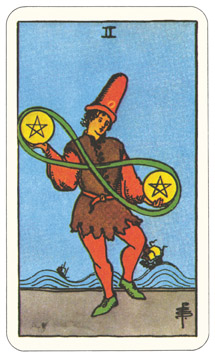 In the Waite-Smith Two of Pentacles, a young man dances while juggling two pentacles connected by an infinity symbol. Behind him, in the distance, two ships ride the crests of high swells of water. Now this is one of those times that my interpretation of the card differs from other people’s. Some descriptions of this card (not all) give the card a lighthearted interpretation of fun and pleasure: the man is juggling and dancing, after all. The Golden Dawn named this card Lord of Harmonious Change, which sounds pleasant enough. But I’ve always figured Smith put those ships in the picture for a reason, and it seems as if their survival in in doubt. The expression on the man’s face looks like worry to me, although maybe it’s just concentration. To me, this card symbolizes a juggling act in the metaphorical sense: managing several things at the same time. In this case, the juggling act distracts people from noticing that things are barely holding together behind him. So far, the man hasn’t dropped the pentacles. Indeed, at the moment captured in the illustration, he’s got a firm grip on both of them. (Is it truly juggling if you never let go?) But in the card Crowley simply called Change, it seems that sooner or later this will come to an end. Jupiter in Capricorn tries to expand within limits, and this could mean having to juggle more and more until, inevitably, there’s too much to manage. Jupiter’s promise of infinity is not delivered on: the infinity symbol itself limits the movement of the two pentacles and makes it harder for the man to juggle them. All together, they look like cogs and a belt: a machine that doesn’t allow for true spontaneity—and the ships struggle on.
In the Waite-Smith Two of Pentacles, a young man dances while juggling two pentacles connected by an infinity symbol. Behind him, in the distance, two ships ride the crests of high swells of water. Now this is one of those times that my interpretation of the card differs from other people’s. Some descriptions of this card (not all) give the card a lighthearted interpretation of fun and pleasure: the man is juggling and dancing, after all. The Golden Dawn named this card Lord of Harmonious Change, which sounds pleasant enough. But I’ve always figured Smith put those ships in the picture for a reason, and it seems as if their survival in in doubt. The expression on the man’s face looks like worry to me, although maybe it’s just concentration. To me, this card symbolizes a juggling act in the metaphorical sense: managing several things at the same time. In this case, the juggling act distracts people from noticing that things are barely holding together behind him. So far, the man hasn’t dropped the pentacles. Indeed, at the moment captured in the illustration, he’s got a firm grip on both of them. (Is it truly juggling if you never let go?) But in the card Crowley simply called Change, it seems that sooner or later this will come to an end. Jupiter in Capricorn tries to expand within limits, and this could mean having to juggle more and more until, inevitably, there’s too much to manage. Jupiter’s promise of infinity is not delivered on: the infinity symbol itself limits the movement of the two pentacles and makes it harder for the man to juggle them. All together, they look like cogs and a belt: a machine that doesn’t allow for true spontaneity—and the ships struggle on.
For other posts in this series, see Astrology of the Minor Arcana.
Another giid artucle on astrology and tarot. Thanks – you make it very understandable, and your wroting style is always enjoyable.
LikeLike
Thank you.
LikeLike
Wonderful post. I especially agree with your take on the last card.
LikeLike
Thank you.
LikeLike
Jupiter in cancer is?
LikeLike
In this system, only 36 of the possible planet and sign combinations gets a card—there aren’t enough cards in the Minor Arcana to pair them all. Jupiter in Cancer is one of those that doesn’t get a card. There’s an explanation of how the system works in the post “The Astrology of the Minor Arcana.” https://cottageupstairs.wordpress.com/2016/05/31/the-astrology-of-the-minor-arcana/
LikeLike